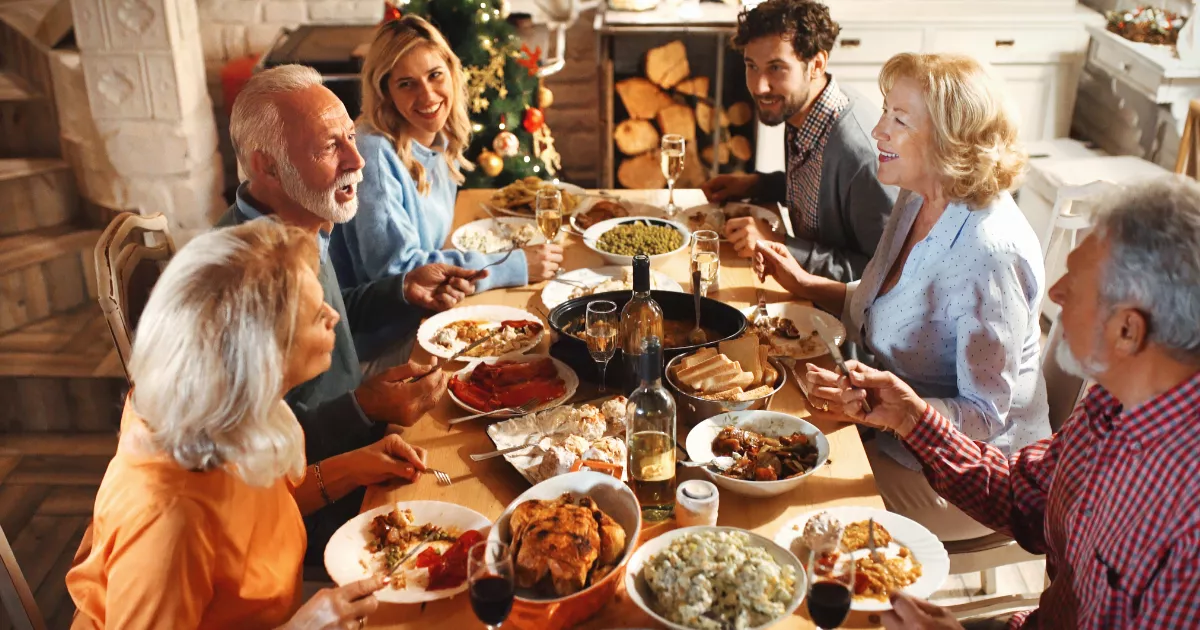
Why Thanksgiving is the Perfect Time to Share Family Health Information
Thanksgiving is a time for visiting family, generating and expressing gratitude, and sharing memories over a delicious meal. Gathering around the dinner table can also be an ideal opportunity to discuss something vital to our well-being—our family health history. In fact, the U.S. Surgeon General has designated Thanksgiving as National Family Health History Day, recognizing the importance of understanding our medical heritage, and using this social gathering as a means to do so. Learn how you can make the most of these conversations for your future health and that of your loved ones.
Why Knowing Your Family Health History is Critical
Family health history refers to the record of diseases and health conditions that run in your family, both nuclear and extended. This information can offer valuable insights into your own risk factors, and help healthcare providers create personalized health plans to prevent or manage potential health issues. Here are some key reasons why understanding your family health history matters.
Identifying Genetic Risks
Certain diseases, such as heart disease, diabetes, and certain cancers, often run in families. By knowing which conditions have affected your relatives, you can get a clearer picture of your genetic risk factors.
For example, if multiple family members have had early-onset heart disease, your risk may be higher, and your doctor can recommend more frequent screenings or lifestyle changes to help mitigate that risk.
Personalizing Your Medical Care
Doctors use family health history to determine which screening tests you might need or which preventive measures are most appropriate for you. For example, if breast cancer runs in your family, your healthcare provider might recommend earlier mammograms or genetic testing for BRCA gene mutations.
Similarly, knowing about a family history of diabetes, kidney disease, or diabetic glaucoma might prompt more regular blood sugar monitoring.
Preventing Future Health Problems
When you understand your family’s health history, you have the power to proactively take your own preventive steps. For example, if high blood pressure or cholesterol is common in your family, you can:
- Make heart-healthy dietary choices,
- Get regular exercise, and
- Have routine screenings to keep your levels in check.
Early detection can make a huge difference in managing conditions before they become more serious.
Helping Future Generations
Passing down health information benefits not only you but also your children and grandchildren. When you document and share your family’s medical history, you give future generations a head start on protecting their own health.
The Mayo Clinic recommends collecting family health history for three or four generations, if possible, including parents and grandparents, children and siblings, aunts and uncles, nieces and nephews. It’s an essential part of leaving a legacy of wellness.
Thanksgiving is a Great Time to Share Family Health Information
Why, you might be wondering, is Thanksgiving of all holidays the right time to talk about family health history? After all, it’s a holiday often associated with relaxation, food, and lightheartedness.
There are several reasons why this gathering presents a golden opportunity to have these crucial conversations.
Everyone is Gathered Together
One of the biggest hurdles to sharing family health information is simply getting everyone in the same place. Thanksgiving tends to bring together multiple generations, which is ideal for discussing shared health history.
Grandparents, parents, siblings, and sometimes extended relatives gather, making it easier to collect and share stories and information.
A Spirit of Sharing and Connection
Thanksgiving is a time for sharing, not just food, but also stories, experiences, and family traditions. Talking about health can be a natural extension of these conversations.
Family members are more likely to be open to discussing their personal experiences when the atmosphere is warm and communal.
A Moment to Reflect on Gratitude for Health
Many families use Thanksgiving to reflect on what they’re thankful for, including health and wellness. It’s an ideal moment to express gratitude for the support family members offer one another and to discuss how everyone can continue to take care of each other in the future by staying informed about health risks and taking preventive measures.
A Time for Planning for the Future
As the year comes to a close, many people start thinking about their health goals for the new year. Learning about your family health history at Thanksgiving can help inform those goals, whether it’s:
- Scheduling screenings,
- Adopting healthier habits, or
- Staying vigilant about potential hereditary conditions.
How to Prepare for Family Health History Discussions
Discussing health topics around the dinner table can feel a bit daunting, especially if it’s not something your family has openly talked about before. With a bit of preparation, however, you can make the conversation comfortable, meaningful, and useful for everyone involved. Here are some steps you can take to prepare:
Do Your Research Ahead of Time
Before Thanksgiving, spend some time researching what questions to ask about family health. The Centers for Disease Control and Prevention (CDC) and other health organizations offer family health history tools that can help you gather relevant information.
Be prepared to ask about specific conditions that might run in the family, such as:
- Heart disease,
- Diabetes,
- Cancer,
- Mental health disorders, and
- Autoimmune conditions.
Start the Conversation Gently
It’s important to approach the topic of family health history with sensitivity. Start by explaining why you think it’s important and how understanding the family’s medical background can help everyone live healthier lives.
You might say something like, “I’ve been thinking a lot about how we can take care of our health, and I’d love to hear more about what our family has experienced with certain conditions so we can all be better informed.”
Create a Safe Space for Sharing
Some family members may feel uncomfortable or vulnerable discussing their health, especially if they’ve had difficult experiences. Make sure the conversation is nonjudgmental and supportive.
You can reassure relatives that the goal is to help everyone be proactive about their health, not to pry or place blame. Don’t attack or try to shame anyone who isn’t comfortable sharing their information.
Bring a Notebook or Use a Health History App
Come prepared to record the information you learn. You can use a simple notebook to jot down important details, take notes on your laptop, or opt for a digital health history app that allows you to document and share information with family members easily.
Make sure to note conditions, ages of diagnosis, treatments, and outcomes, including ages at time of death, as well as any lifestyle factors that might have contributed to health complications. Include specifics about race, ethnicity, and place of birth if you can.
Follow Up After the Conversation
Once you’ve gathered information, you can follow up with family members by sharing a summary of what you learned, but only if everyone involved has given their consent to have their information shared with the others.
Sharing the collected information and getting everyone on the same page can be especially helpful for relatives who weren’t able to attend the gathering. Encourage everyone to keep adding to the family health record as new information becomes available. You can make it a point to revisit the conversation at future family events.
Takeaway
Thanksgiving is not just a time to gather with loved ones and enjoy a feast—it’s also an opportunity to safeguard your family’s health for generations to come. Understanding your family’s medical history can help you take proactive steps to prevent or manage health issues, and Thanksgiving, with its spirit of togetherness, is the perfect time to start these meaningful conversations.
By preparing ahead, creating a safe environment for sharing, and recording the information you gather, you can empower yourself and your family to live longer and healthier lives.



